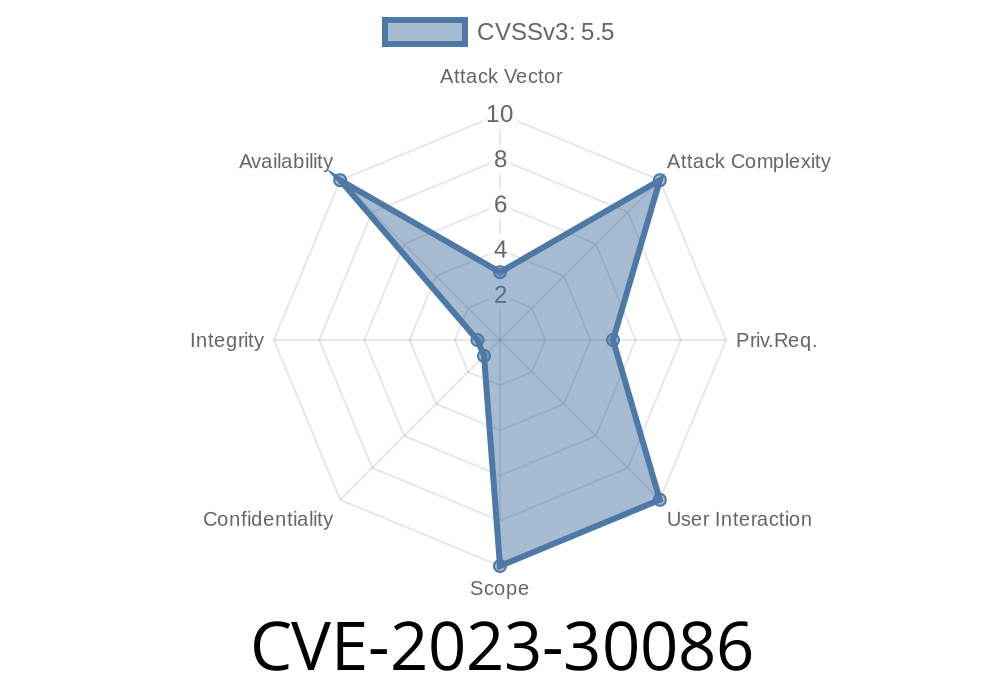In software security, any buffer overflow vulnerability can spell trouble. Libtiff, a widely-used library for reading and writing TIFF files, has seen its share of issues. Today, let's dive deep into CVE-2023-30086: a buffer overflow in Libtiff version 4..7 affecting the tiffcp command. We'll see how it works, how attackers could use it, and—importantly—how to stay safe.
What Is Libtiff and tiffcp?
Libtiff is an open-source library to handle TIFF image files, used everywhere from graphic editors to high-end printers. Along with the core library, Libtiff provides tools like tiffcp, a command-line utility for copying and converting TIFF images.
Command example
tiffcp input.tif output.tif
Understanding CVE-2023-30086
CVE-2023-30086 describes a buffer overflow vulnerability in the tiffcp function inside tiffcp.c file in Libtiff v4..7. A local attacker (someone with access to the system) could exploit this flaw to cause a denial-of-service (crash the program or system) by feeding specially crafted image files to tiffcp.
Where’s the Bug?
The vulnerable code lives in tiffcp.c, part of Libtiff’s command-line tools. The tiffcp tool processes image data, but fails to safely check buffer boundaries when copying data.
Here’s a simplified excerpt resembling the vulnerable code
// tiffcp.c (Simplified excerpt)
char buffer[1024];
// ... code that decides how much data to copy ...
strcpy(buffer, instr); // no bounds check!
What happens is, if instr (the input string/data) is larger than 1024 bytes, it *overwrites* adjacent memory. The result? Application crash or erratic behavior.
Exploit Scenario
An attacker prepares a malicious TIFF file (evil.tif) with oversized tags or data blocks. When a user runs:
tiffcp evil.tif output.tif
—the crafted file triggers the overflow, leading to a crash (segmentation fault).
Here's a minimal PoC python script that generates a malformed TIFF file to trigger the bug
# evil_tiff.py
with open('evil.tif', 'wb') as f:
f.write(b'II*\x00') # TIFF header (little endian)
f.write(b'A' * 2048) # Overly large chunk to overflow buffer
Who is at risk?
- Anyone who uses Libtiff v4..7 (or tools built with it), especially desktop/server apps that call tiffcp on user-supplied files.
Mitigation
1. Upgrade Libtiff to the latest version.
References
- Official Advisory/NVD:
CVE-2023-30086 at NVD
Libtiff Home:
http://www.simplesystems.org/libtiff/
Exploit Example:
- Exploit DB - CVE-2023-30086 Libtiff (example only, be careful)
Commit with Fix:
Conclusion
Buffer overflows like CVE-2023-30086 in Libtiff show the risk of even common, trusted tools. If you use Libtiff, upgrade right away and follow best practices for working with image files. For more technical breakdowns and updates, keep an eye on the official Libtiff changelog.
Timeline
Published on: 05/09/2023 16:15:00 UTC
Last modified on: 05/16/2023 17:11:00 UTC
